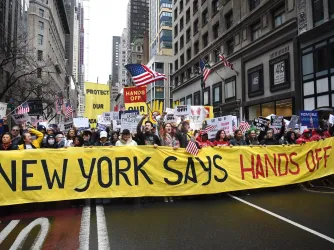Table of Contents
VICTORY: UMass Boston quietly removes DEI requirements from faculty applications

Photo courtesy of UMass Boston
The University of Massachusetts Boston has eliminated mandates for faculty applicants to express particular views about diversity, equity, and inclusion after months of back-and-forth with FIRE. Such mandates often function as political litmus tests for adherence to prevailing ideological views on DEI and can too easily be used to penalize faculty for holding dissenting opinions.
In June, FIRE learned of faculty job listings requiring applicants to express their commitment to DEI. In particular, an application for a computer science professor position required “a diversity statement that reflects” not only experience with, but “commitment” to, diversity, equity, and inclusion. Another such listing required applicants to demonstrate a commitment “to support[ing] our goal of ensuring an inclusive, equitable, and diverse workplace and educational environment.”
Universities may choose to prioritize diversity initiatives. But public institutions like UMass Boston — bound by the First Amendment — must also uphold the freedom of expression and academic freedom rights of their faculty. FIRE has repeatedly seen DEI mandates used as political litmus tests in practice, used by administrators to filter out applicants whose views on these widely-debated subjects differ in any way from that of administrators. And half of surveyed faculty members agree that such DEI mandates can function as political litmus tests. This potential for abuse was at the heart of our objection to UMass Boston’s requirements.
As we explained to UMass Boston in June:
Universities succeed in their unique role as “peculiarly the ‘marketplace of ideas’” only by engaging in the objective search for knowledge unburdened by undue pressures. The DEI requirements for faculty applicants encroach on faculty’s First Amendment right not to adopt prescribed views. Their subjective criteria could easily also be abused to penalize applicants with minority, dissenting, or even simply nuanced views on DEI-related issues that may not dovetail perfectly with the university’s goals. Such an outcome would lead toward the university becoming an echo chamber for its preferred views.
We therefore called on UMass Boston to eliminate DEI commitment requirements from all faculty applications, so that applicants can follow the dictates of their own consciences without fear of negative consequences.
UMass Boston responded on July 28 to assure us it would “continue to support” its faculty’s constitutional rights, but it failed to address the crux of FIRE’s concern. We replied on Aug. 3, relaying our disappointment at UMass Boston’s failure to explicitly confirm that it would remove DEI requirements in faculty applications. In the meantime, the university continued to post new faculty job listings with vague DEI requirements.
FIRE will advocate for as long as needed to protect those rights on campus and beyond.
Late last month, FIRE wrote UMass Boston one last time, reiterating our demand. While the university’s final response simply referred us to its prior correspondence, we subsequently noticed the DEI requirements were indeed gone. They also do not appear in newer job listings.
While UMass Boston took nearly five months to remove these DEI requirements from its faculty applications, we’re happy it eventually got there. As we at FIRE know well, the fight for First Amendment rights has no expiration date. FIRE will advocate for as long as needed to protect those rights on campus and beyond.
Recent Articles
Get the latest free speech news and analysis from FIRE.

He refused to censor his syllabus — so Texas Tech cancelled his class

Fandom’s lighthouse in a sea of censorship

FIRE statement on Stephen Colbert’s James Talarico interview and continued FCC pressure



